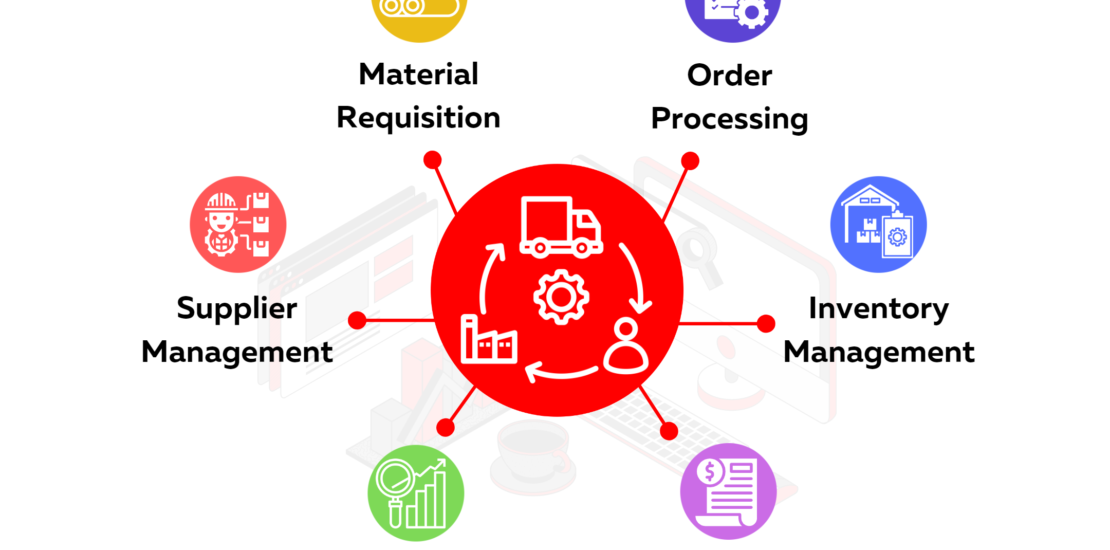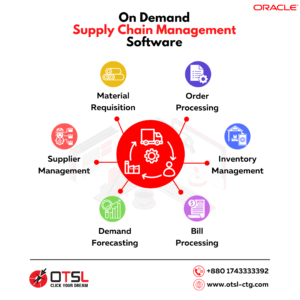Supply Chain Management System
- July 10, 2023
- Posted by: shakil
- Category: Software

 A supply chain management (SCM) system is a software solution that enables organizations to manage and optimize their supply chain operations. It encompasses the processes involved in planning, sourcing, manufacturing, delivering, and returning products or services. SCM systems help businesses streamline their operations, reduce costs, improve efficiency, and enhance customer satisfaction.
A supply chain management (SCM) system is a software solution that enables organizations to manage and optimize their supply chain operations. It encompasses the processes involved in planning, sourcing, manufacturing, delivering, and returning products or services. SCM systems help businesses streamline their operations, reduce costs, improve efficiency, and enhance customer satisfaction.
Here are some key features and functionalities typically found in a supply chain management system:
1. Demand planning and forecasting: SCM systems provide tools to analyze historical data, market trends, and customer demand patterns to forecast future demand accurately. This helps organizations optimize their inventory levels and plan production and procurement accordingly.
2. Inventory management: SCM systems facilitate inventory tracking, control, and optimization. They provide real-time visibility into stock levels, locations, and movement throughout the supply chain, enabling efficient inventory replenishment and reducing the risk of stockouts or excess inventory.
3. Supplier management: These systems help manage relationships with suppliers by maintaining a centralized supplier database, tracking performance metrics, and facilitating communication and collaboration. They assist in supplier selection, contract management, and monitoring supplier compliance.
4. Procurement and purchase order management: SCM systems automate and streamline the procurement process, from creating purchase orders to supplier invoicing. They help optimize purchasing decisions, manage supplier catalogs, and track order status, ensuring timely delivery and cost control.
5. Warehouse and distribution management: SCM systems assist in managing warehouse operations, including receiving, putaway, picking, packing, and shipping. They optimize warehouse layouts, track inventory movements, and coordinate logistics activities to improve efficiency and reduce errors.
6. Transportation management: These systems enable efficient planning and execution of transportation activities, including route optimization, carrier selection, load optimization, and real-time tracking of shipments. They help reduce transportation costs, improve delivery performance, and enhance customer service.
7. Supply chain analytics and reporting: SCM systems provide analytical tools and reporting capabilities to analyze supply chain performance metrics, identify bottlenecks, and make data-driven decisions. They offer insights into key performance indicators (KPIs), such as on-time delivery, order fulfillment rates, and inventory turnover.
8. Integration and collaboration: SCM systems integrate with other enterprise systems, such as enterprise resource planning (ERP), customer relationship management (CRM), and financial systems, to ensure seamless data flow and coordination across different departments. They also enable collaboration with partners, suppliers, and customers through features like electronic data interchange (EDI) and supplier/customer portals.
Overall, a supply chain management system helps organizations optimize their supply chain processes, enhance visibility and control, reduce costs, and improve customer satisfaction by ensuring products or services are delivered efficiently and on time.
